|
|
|
Sort Order |
|
|
|
Items / Page
|
|
|
|
|
|
|
| Srl | Item |
| 1 |
ID:
078432
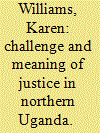

|
|
|
| 2 |
ID:
188416
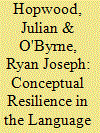

|
|
|
|
|
| Summary/Abstract |
This special issue explores post-conflict recovery in northern Uganda from the perspective of survivors themselves. Normative notions of resilience are widely critiqued as reductive, depoliticising and simplistic. Although the papers here, based on ethnographic methodologies, are largely sympathetic to this understanding, they also suggest that consideration of resilience should not be abandoned. The papers offer insights into how communities’ experiences and strategies of resilience often diverge from the ambitions of international actors. They demonstrate that micro-level studies of real people’s experiences of post-conflict recovery allow space for wider comparative and theoretical insights to emerge.
|
|
|
|
|
|
|
|
|
|
|
|
|
|
|
|
| 3 |
ID:
161721
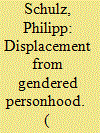

|
|
|
|
|
| Summary/Abstract |
This article empirically deconstructs the gendered effects of sexual violence on male survivors' masculinities in northern Uganda. Throughout the growing literature on the topic, the effects of wartime gender-based violence against men are widely seen as compromising male survivors' masculine identities, commonly framed as ‘emasculation’ by way of ‘feminization’ and/or ‘homo-sexualization’. Yet exactly how such processes unfold from survivors' perspectives remains insufficiently explored, nor has existing scholarship critically engaged with the dominant analytical categories and their associated terminologies. This article seeks to engage with both of these gaps. First, I identify normative and analytical shortcomings of the ‘emasculation’/‘feminization’ paradigm. Drawing on Edström, Dolan and colleagues, I propose an alternative reading to analyse the effects of sexual violence on gender identities. Second, I argue that the impact of sexual violence on masculinities is a layered process, compounded through numerous sexual and gendered harms and perpetuated over time. In northern Uganda, this process is composed of intersecting gendered harms that subordinate male survivors along gendered hierarchies, and that signify survivors' perceived inabilities to provide, protect and procreate—as expected of them by local constructions of hegemonic masculinity. I therefore emphasize that sexual violence against men strikes at multiple levels of what it means to be a man, which is important to understanding and addressing these layered gendered harms in the aftermath of the violations.
|
|
|
|
|
|
|
|
|
|
|
|
|
|
|
|
| 4 |
ID:
143541
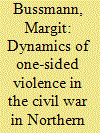

|
|
|
|
|
| Summary/Abstract |
The analysis aims at detecting patterns in the use of violence against the civilian population in the Civil War that was fought in the North of Uganda by the Lord’s Resistance Army (LRA), an armed group that is known for its atrocities. One-sided violence increased with a decline in popular support and was related to the support of an external patron who influenced the relative military strength. The results of the quantitative analysis indicate that the LRA’s use of violence varied systematically with battle-related activities and was higher after the LRA had to suffer losses in combat.
|
|
|
|
|
|
|
|
|
|
|
|
|
|
|
|
| 5 |
ID:
103128
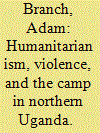

|
|
|
|
|
| Publication |
2009.
|
| Summary/Abstract |
This article shows how international humanitarianism and state violence developed a sustained relation of mutual support during the civil war in northern Uganda. This collaboration was anchored in the archipelago of forced displacement camps, which at the peak of the war contained about a million people, and which were only able to exist because of, first, the violence of the Ugandan state in forcing people into them, preventing people from leaving, and repressing political organisation in the camps; and, second, the intervention of international humanitarian aid agencies, which fed, managed, and sustained the camps for over a decade. The consequence was that state violence and international humanitarianism each depended on the other for its own viability.
|
|
|
|
|
|
|
|
|
|
|
|
|
|
|
|
| 6 |
ID:
126991
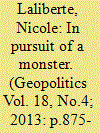

|
|
|
|
|
| Publication |
2013.
|
| Summary/Abstract |
Through a feminist geopolitical analysis, this article interrogates the role of monster narratives in producing geographic imaginaries of difference and lived experiences of insecurity in northern Uganda. Building upon theories of monsters as cultural imaginaries, I argue that state and non-state actors evoke colonial-era constructions of difference to construct Joseph Kony, leader of the Lord's Resistance Army (LRA), as a monster to support contemporary geopolitical agendas. By troubling state-based definitions of security, this article disputes the idea that security practices predicated on the defeat of a monster translate into increased security for those most directly affected by the violence of the monster. Additionally, this article discusses alternative narratives circulating in northern Uganda that offer different readings of Kony's role in the cycles of violence that have ravaged the region. These narratives, when viewed through a feminist geopolitical lens, challenge the monster imaginary and, with it, the geopolitics of militarisation.
|
|
|
|
|
|
|
|
|
|
|
|
|
|
|
|
| 7 |
ID:
129501
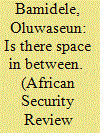

|
|
|
|
|
| Publication |
2014.
|
| Summary/Abstract |
The politicisation of religion in Africa is causing the international community growing concern, particularly the smouldering hatred between Muslims and Christians. The rising wave of religious violence across the continent has given rise to a proliferation of arms that has led to armed struggle in many African states. This paper sets out to examine the recurring issue of religion and armed conflicts in some African states. It will consider two monotheistic religions - Christianity and Islam - and the way they have interacted with each other in the region. And, finally, it examines the different ways in which religious activities are related to armed conflict in northern Nigeria, northern Uganda, Sudan, Somalia and Rwanda.
|
|
|
|
|
|
|
|
|
|
|
|
|
|
|
|
| 8 |
ID:
155007


|
|
|
|
|
| Summary/Abstract |
This paper argues that violent conflict prominently impacts on land governance and so contributes to land conflicts in post-conflict settings. In the natural resources literature, the relationship between land and conflict is often explained in terms of environmental security or political ecology, and many have pointed out that the way land is governed in itself may be a source of conflict. However, less attention has been given to the effects of violent conflict on land and its governance in post-conflict situations. This paper argues that violent conflict affects land governance in many ways and that this in turn might contribute to further violent conflict. The argument builds around an extended case study of the Apaa evictions in Amuru District in Northern Uganda. The case illustrates how conflict around land is not just the result of resource scarcity and competition, but is the outcome of a combination of political, historical and social dynamics. Past policies on land and practices of land governance play a critical role in this. However at the same time, violent conflict has a critical impact on land access, transforms land governance authority and the rules applied. The land conflicts resulting from this, in turn, fuel ethnic tensions between local population groups, and grievances about those in power and the institutions that govern natural resources. The ways in which such problematic conflict-induced changes in land access and governance are dealt with by policymakers is critical for post-conflict stability.
|
|
|
|
|
|
|
|
|
|
|
|
|
|
|
|
| 9 |
ID:
179119
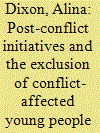

|
|
|
|
|
| Summary/Abstract |
Young people are among the most severely impacted by conflict and as such many post-conflict initiatives are aimed at assisting them. Yet the impacts of these initiatives on young people's ability to successfully overcome the adversity they faced during conflict are not fully understood. This paper attempts to examine these impacts by conceptualising post-conflict initiatives as enmeshed within young people's social environments. It argues that post-conflict initiatives are intimately connected to broader processes of exclusion from social systems such as the family. While these systems had previously served to protect young people against adversity, conflict and post-conflict initiatives have disrupted their ability to continue this mission. In particular, the structure and function of the family system are examined to demonstrate the types of disruptions that have taken place that have ultimately negatively impacted the landscape in which young people develop.
|
|
|
|
|
|
|
|
|
|
|
|
|
|
|
|
| 10 |
ID:
188425
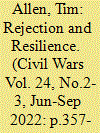

|
|
|
|
|
| Summary/Abstract |
This article focuses on young people who returned from the Lord’s Resistance Army in northern Uganda, mostly as children, over ten years ago. They are, by definition, resilient, because they have survived, but there are important variations. For the most part, those who managed to gain status in the LRA, are those most likely to present themselves as ‘resilient’ according to notions of self-reliance and entrepreneurialism. The majority are not in this position. They are mainly living in rural locations, and commonly face social rejection and extreme poverty. Supporting normative models of resilience has exacerbated deprivation of the most vulnerable.
|
|
|
|
|
|
|
|
|
|
|
|
|
|
|
|
| 11 |
ID:
188420
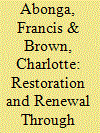

|
|
|
|
|
| Summary/Abstract |
Building on the proposal for a ‘culturally sensitive’ framework of resilience, this article explores the construction of resilience at an individual and community level. Through the lens of sport, we explore the relational nature of resilience and its relationship to ideas of morality and community well-being. Using interviews and focus groups conducted across northern Uganda 2018–2020, we engage youth perspectives on resilience or restoration (roco). We emphasise the gendered dimensions that shape different stakeholder’s understandings of the concept and that, in this context, the pursuit of a community-affirmed vision of resilience or good surroundings (piny maber) reinforces pre-existing inequalities.
|
|
|
|
|
|
|
|
|
|
|
|
|
|
|
|
| 12 |
ID:
157587
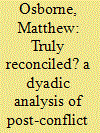

|
|
|
|
|
| Summary/Abstract |
In the aftermath of civil war or violent internal conflict, one of the key peacebuilding challenges is the reconciliation of former enemies who are members of the same small-scale societies. A failure of social reintegration may contribute to what is known as a conflict trap. To detect lingering hostile attitudes among a community’s various factions is crucial, but the approaches adopted in previous studies tend to focus on the impact of conflict on one or other aggregated indicator of social cohesion rather than on how violence-affected individuals regard and act towards their fellow community members. Here we demonstrate the value of concentrating on this latter dyadic component of social interactions and we use behavioural experiments and a social tie survey to assess, in an appropriately disaggregated manner, social cohesion in a post-conflict setting in northern Uganda. Whereas in self-reported surveys, ex-combatants appear to be well-connected, active members of their communities, the experiments unveil the continued reluctance of other community members to share or cooperate with them; fewer resources are committed to ex-combatants than to others, which is statistically significant. The dyadic nature of our analysis allows us to detect which groups are more prone to discriminate against ex-combatants, which may help facilitate targeted interventions.
|
|
|
|
|
|
|
|
|
|
|
|
|
|
|
|
| 13 |
ID:
141069
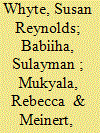

|
|
|
|
|
| Summary/Abstract |
As peace returns to northern Uganda, a unique arithmetic of development is evident in the former Internally Displaced Persons camps. Small trading centres whose populations multiplied as they became camps now envision futures as Town Boards. Subtraction is necessary: the displaced people and the dead buried in the camps are being returned to their rural villages. Urban planners have produced meticulous drawings that envisage the division of land into plots for development. Donors are making additions in the form of new market buildings and water supplies. Yet this arithmetic must reckon with new problems as time passes. The article is based primarily on fieldwork in Awach, a former IDP camp now slated for status as a Town Board. In analysing material from interviews with landowners, ‘remainders’ who stayed behind after the camp closed, local leaders and officials, we emphasise the paradoxes, tensions and conflicts of this special path to development.
|
|
|
|
|
|
|
|
|
|
|
|
|
|
|
|
|
|
|
|
|